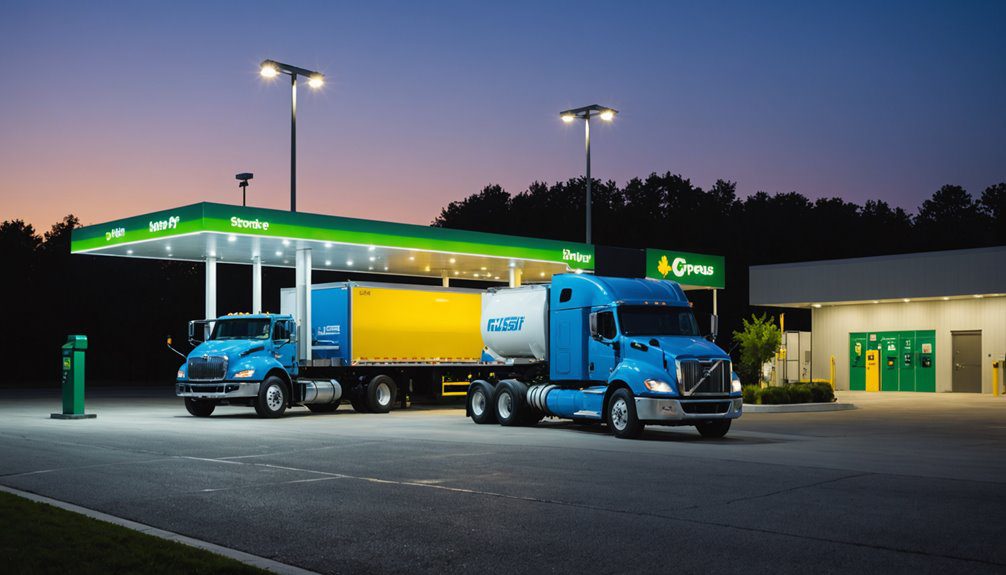If you're considering making a significant investment in alternative fuels, the Virginia Fuels Tax- Bulk User of Alternative Fuel Bond could be a valuable opportunity for your business. This bond not only supports your transition to cleaner energy but also offers various financial incentives that can enhance your operational efficiency. However, navigating eligibility and compliance can be complex, and understanding the full scope of benefits requires more than just a surface glance. What might surprise you are the unexpected advantages that come with this program and how they can transform your business strategy.
Overview of the Virginia Fuels Tax

The Virginia Fuels Tax is a crucial component of the state's revenue system, designed to fund transportation infrastructure and services. This tax applies to various fuel types, including gasoline, diesel, and alternative fuels.
When you fill up your vehicle, a portion of the price you pay goes toward this tax, directly impacting the state's ability to maintain and improve its roads, bridges, and public transportation systems.
The tax rate fluctuates based on market conditions and is calculated per gallon of fuel sold. This means that the amount you contribute can vary depending on the type of fuel and the current price.
You mightn't think about it while pumping gas, but these funds play a vital role in ensuring that Virginia's transportation network remains efficient and safe.
In addition to supporting infrastructure projects, the Virginia Fuels Tax helps fund safety programs and environmental initiatives related to fuel consumption.
By understanding how this tax works, you can see how your contributions are essential for maintaining and enhancing the transportation system you rely on daily.
Importance of Alternative Fuels
Alternative fuels play a significant role in shaping Virginia's transportation landscape and addressing environmental concerns. By choosing alternative fuels, you're not just reducing your carbon footprint; you're also contributing to cleaner air and a healthier environment. These fuels, which include biodiesel, ethanol, and electricity, often produce fewer emissions than traditional gasoline or diesel.
Switching to alternative fuels can also enhance energy security. When you rely on domestic resources, you reduce dependence on foreign oil, which can lead to more stable fuel prices.
Plus, investing in alternative fuels fosters innovation and job creation in local economies, as new technologies and infrastructure are developed.
You'll find that adopting alternative fuels can lead to significant cost savings over time. While the initial investment may seem daunting, the long-term benefits often outweigh the upfront costs. As technology continues to improve, alternative fuels are becoming more efficient and accessible.
In Virginia, embracing these fuels can pave the way for sustainable transportation solutions, ensuring a cleaner and more resilient future for everyone.
Your choice to support alternative fuels isn't just a personal decision; it's a step towards a better world for future generations.
Eligibility for the Bond

To qualify for the Virginia fuels tax bond, you must meet specific criteria set by the state. First, you'll need to be a bulk user of alternative fuels, which means you're purchasing significant quantities for your operations. Your business must also be registered in Virginia and comply with all local and state regulations regarding fuel usage.
Next, you'll need to demonstrate that your alternative fuel usage aligns with Virginia's environmental goals. This often involves providing documentation showing how your operations contribute to reducing emissions. Additionally, you may need to present a detailed plan outlining your fuel consumption and how it fits into existing state programs promoting alternative fuels.
It's also essential to maintain accurate records of your fuel purchases and usage. The state requires transparency to ensure that funds are used appropriately and effectively.
Lastly, be prepared to submit an application detailing your eligibility, along with any necessary supporting documents.
Financial Incentives Provided
Virginia offers several financial incentives designed to support businesses that utilize alternative fuels. These incentives help reduce operational costs and encourage the transition to cleaner energy sources.
One of the primary benefits you can access is the tax exemption on the sale of alternative fuels. This can significantly lower your expenses, making it more feasible to adopt and integrate alternative fuel options into your operations.
Additionally, you may qualify for grants aimed at funding the installation of alternative fueling infrastructure. These grants can assist with the costs associated with building fueling stations or upgrading existing facilities to accommodate alternative fuels.
Another attractive incentive is the reduced registration fee for vehicles that run on alternative fuels. This fee reduction can lead to considerable savings, especially if you have a large fleet.
Application Process for Businesses

Navigating the application process for financial incentives can seem daunting, but it's essential for businesses looking to benefit from Virginia's alternative fuel programs.
First, gather all necessary documents, including proof of fuel usage and any relevant business licenses. Make sure your business is registered with the appropriate local and state agencies.
Next, fill out the application form accurately. Pay close attention to details, as inaccuracies can delay your approval. It's helpful to review the guidelines provided by the Virginia Department of Taxation to ensure you're meeting all requirements.
Once you've completed the application, submit it along with any required documentation. Keep a copy for your records, and note any deadlines associated with the program.
After submission, be prepared to respond to any requests for additional information or clarification from the state. Additionally, ensure that you maintain compliance with tax regulations to avoid any potential issues during the application process.
Impact on Local Economy
Understanding the application process for financial incentives is just the beginning; the broader impact on the local economy is significant. When businesses engage with the Virginia Fuels Tax and utilize the Bulk User of Alternative Fuel Bond, they're not just benefiting themselves; they're creating a ripple effect in the community.
These initiatives can lead to job creation, as companies expand their operations and require more staff. Moreover, increased investment in alternative fuels can stimulate local suppliers and services, boosting the economy even further.
You'll likely see a rise in demand for local goods, from fuel suppliers to maintenance services, which can enhance the overall economic landscape. In addition, as more businesses adopt alternative fuels, the community can experience improved air quality and reduced emissions, making it a healthier place to live.
This environmental benefit can attract more residents and businesses, bolstering the local economy even more.
Compliance and Reporting Requirements

When engaging with the Virginia Fuels Tax, compliance and reporting requirements are crucial for businesses to grasp. You need to keep accurate records of all fuel purchases and usage to ensure you're meeting state regulations. It's essential to document the quantities and types of fuel used, especially if you're utilizing alternative fuels.
You must file periodic reports, typically on a monthly or quarterly basis, detailing your fuel usage. These reports should include information like the total gallons of fuel consumed and the sources of your fuel. Make sure to submit these reports on time to avoid penalties.
Additionally, you'll need to maintain receipts and invoices related to your fuel transactions for a minimum of three years. This documentation not only helps in case of any audits but also supports your claims for any tax credits or refunds associated with alternative fuels.
Lastly, staying updated on any changes in tax regulations is vital. Regularly check the Virginia Department of Taxation's website for updates to ensure you remain compliant and take full advantage of available benefits.
Case Studies of Successful Users
Many businesses have thrived by effectively leveraging the Virginia Fuels Tax, demonstrating innovative strategies that not only ensure compliance but also maximize savings.
For instance, a local logistics company switched to alternative fuels, significantly cutting its fuel costs while benefiting from the tax incentives. By diligently tracking and reporting their fuel usage, they successfully navigated compliance requirements, allowing them to reinvest the savings into expanding their fleet.
Another example is a regional waste management firm that adopted compressed natural gas (CNG) vehicles. They utilized the Virginia Fuels Tax to offset the initial investment in CNG infrastructure. By showcasing their commitment to sustainability and efficiency, they attracted environmentally conscious clients, further enhancing their market position.
Lastly, a delivery service implemented a comprehensive training program for employees on alternative fuel usage and reporting. This initiative not only improved compliance rates but also fostered a culture of sustainability within the company.
As you can see, these case studies highlight how leveraging the Virginia Fuels Tax can lead to impressive outcomes. By adopting similar strategies, your business can enjoy increased savings and contribute positively to the environment.
Future of Alternative Fuel Initiatives

As businesses increasingly embrace alternative fuels, the future of these initiatives looks promising. You'll likely see a surge in innovative technologies and improved infrastructure that makes using alternative fuels more accessible and practical. With governments offering incentives and funding, it's becoming easier for companies like yours to transition to cleaner energy sources.
The collaboration between private sectors and public institutions is crucial. By working together, they can address challenges such as supply chain logistics and fueling station availability. You'll notice partnerships that drive investment into research and development, leading to breakthroughs in fuel efficiency and storage solutions.
Additionally, consumer demand for sustainable practices is on the rise. You may find that customers prefer businesses that prioritize environmentally friendly operations. This shift could encourage more companies to adopt alternative fuels, enhancing their market competitiveness.
Furthermore, as regulations tighten around emissions, businesses that proactively switch to alternative fuels can avoid penalties and position themselves as industry leaders.
Resources for Further Information
Finding reliable resources for further information on Virginia's fuels tax and alternative fuel initiatives is crucial for your business's success. Start by visiting the Virginia Department of Taxation's website. They provide up-to-date details on tax rates, regulations, and any changes that might affect your operations.
You can also explore the Virginia Department of Energy, which highlights alternative fuel programs and incentives that could benefit your business.
Another valuable resource is the Virginia Clean Cities Coalition. They offer insights into local initiatives and partnerships aimed at promoting alternative fuels. Networking with industry groups can also provide firsthand information and best practices.
Don't overlook academic and research institutions in Virginia. Many publish reports and studies on fuel trends and environmental impacts, giving you a deeper understanding of the market landscape.
Lastly, consider subscribing to industry newsletters or joining relevant forums. These platforms often share timely updates, regulatory changes, and emerging technologies in the alternative fuel sector.
Conclusion
In conclusion, the Virginia Fuels Tax – Bulk User of Alternative Fuel Bond is a game-changer for businesses looking to invest in cleaner energy. By taking advantage of the financial incentives and support available, you can not only reduce operational costs but also contribute to a more sustainable future. If you're eligible, don't hesitate to apply and be a part of Virginia's commitment to innovative energy solutions. Your efforts can make a significant impact on the environment and your bottom line.

